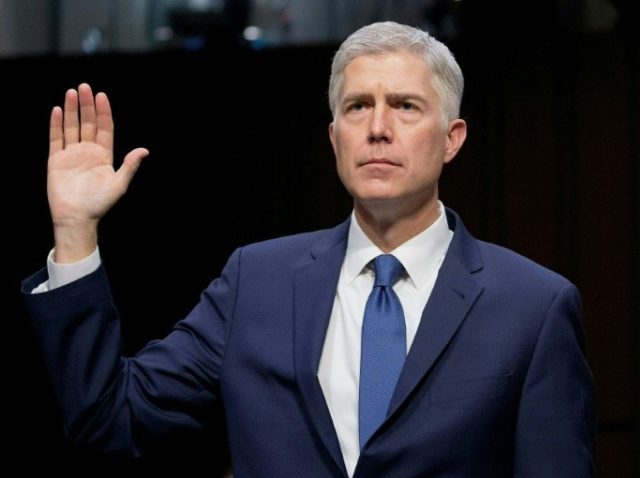The Senate Judiciary Committee, in a party-line 11-9 vote Monday, has passed Judge Neil Gorsuch, President Donald Trump’s nominee to replace conservative stalwart Justice Antonin Scalia, setting up a full Senate confirmation vote for April 7.
The vote sets the stage for a clash on Senate rules for Supreme Court nominees. At least forty-one Senate Democrats, now including Sen. Jon Tester (D-MT), whose state President Trump won by over twenty points, and Senators Patrick Leahy (D-VT), Mark Warner (D-VA) and Diane Feinstein (D-CA), who announced their opposition to Gorsuch at the hearing, have now expressed their intention to initiate the first partisan filibuster of a Supreme Court nominee in American history.
Despite Sen. Michael Bennet (D-CO), who told the Colorado Independent that he will not filibuster his fellow Coloradan Gorsuch, and three Democrats who have said they will support Gorsuch, Senate Minority Leader Chuck Schumer (D-NY) now appears to have the votes needed to prevent a vote for cloture and a full Senate vote on Gorsuch’s confirmation under current rules.
Senate Democrats changed Senate rules in 2013 to allow a simple majority to trigger a full Senate vote on non-Supreme Court nominees. Increasing numbers of Republicans, including Senate Majority Leader Mitch McConnell (R-KY), appear poised to use the same “Constitutional Option” for Supreme Court nominees in order to ensure Gorsuch’s confirmation.
During Monday’s final Judiciary Committee meeting on Gorsuch, Sen. Lindsay Graham (R-SC) reiterated Republican willingness to revert to the constitutional option. “We’ve had one successful filibuster of a Supreme Court Nominee, that was that was bipartisan with Abe Fortas. By the end of the week, that will still be the case,” he told the committee with a smile.
Democrats on the Committee used their final opportunity to air their grievances with Trump’s pick for the high court. Sen. Dick Durbin (D-IL) went so far as to call the Federalist Society, an association of conservative lawyers that endorsed Gorsuch, a “special interest group” and launched into an extended diatribe against the validity of judicial originalism, the idea that the constitution and laws ought to be interpreted according to the original intentions of the drafters. Durbin quoted the late liberal Supreme Court Justice William Brennen as calling the very idea judges can find the intention of the Founders as “arrogance cloaked in humility.”
Sen. Chris Coons (D-DE), who had held out on supporting the proposed filibuster and was posited as a possible partner in a deal to save the sixty-vote cloture requirement, used the Committee meeting to come out against an up or down vote on Gorsuch. “I am not ready to end debate on this issue, so I will be voting against cloture unless we are able, as a body, to find a way to sit down and avoid the ‘nuclear option,'” he told the Committee.
Sen. John Cornyn (R-TX) downplayed the idea the increasingly likely constitutional option to confirm Gorsuch on a simple majority vote is a stark break with Senate tradition. “I disagree with those who say this is the end of the Senate as we know it. This is a restoration of the status quo ante, before our Democratic colleagues erected this artificial sixty vote requirement.”
The Committee also approved Deputy Attorney General nominee Rod Rosenstein with some Democratic support and Rachel Brand, nominee for Associate Attorney General, along a party-line vote.

COMMENTS
Please let us know if you're having issues with commenting.